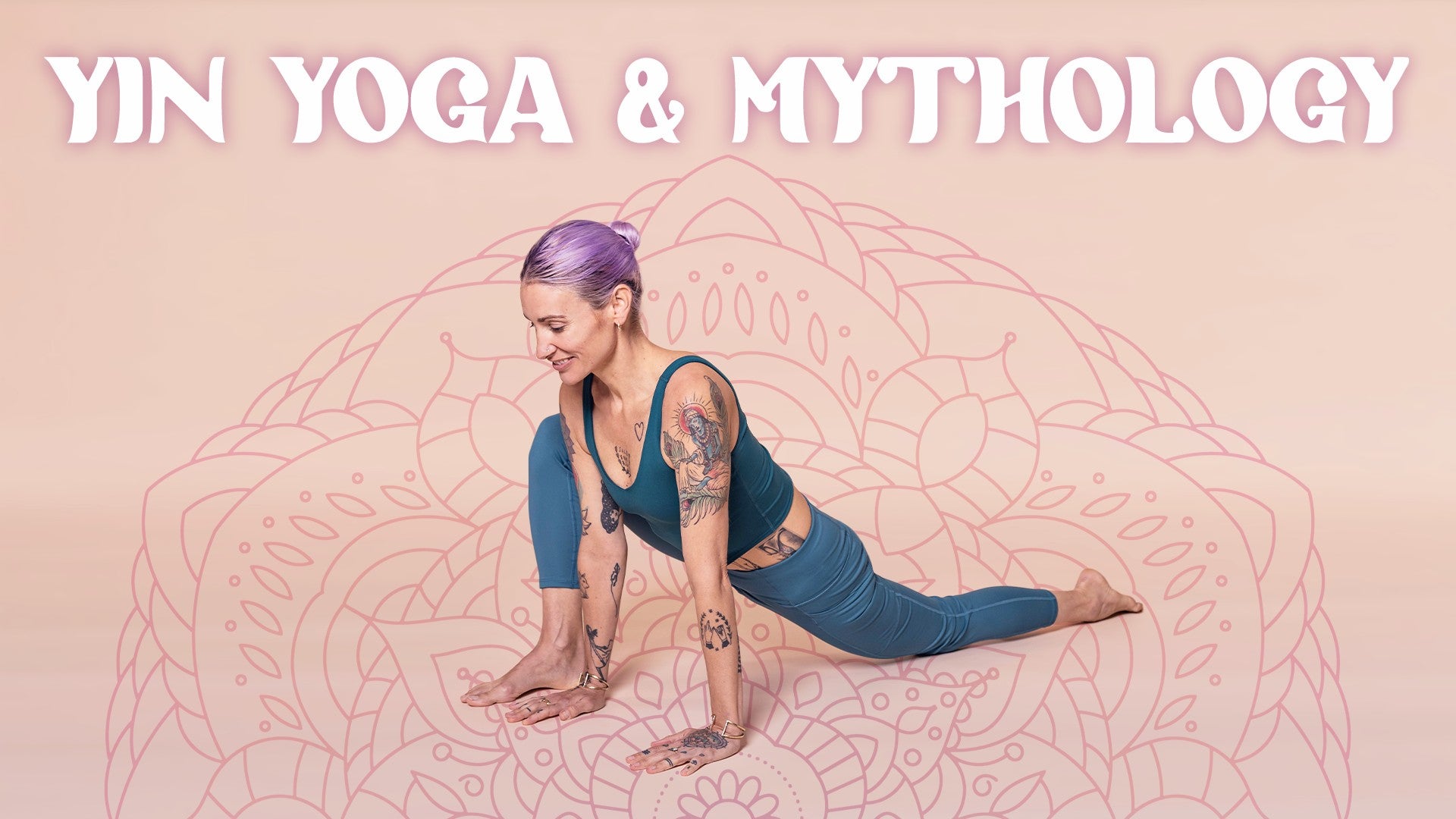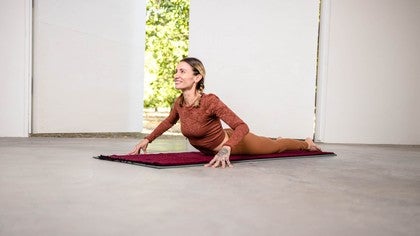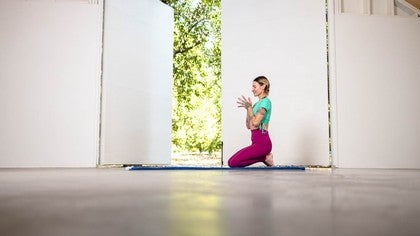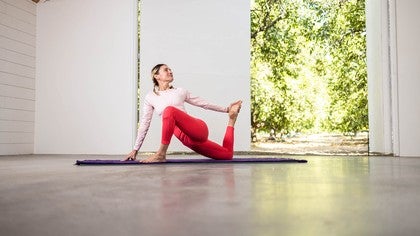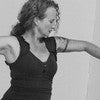Description
About This Video
Transcript
Read Full Transcript
Thanks for joining me for this practice. We're going to do tons of heart-focused poses today, opening the chest in every different direction. We're going to fall, we're going to play, we're going to have a little fun, all in the spirit of the Persian mystic poet Rumi, and inspired really by Rumi's quote that the wound is where the light enters, which I imagine some of you have heard before, probably you've been in a yoga class somewhere and the teacher has quoted some Rumi quote, and we all love it. We just love Rumi. I'm going to share the story behind the poetry today, so we're going to use two blocks, and one block is going to be for our heads, I'm putting that one horizontally, the other block is going to be for our chest, for our upper back really, right between the shoulder blades, and it's going to go right behind the heart, and so we'll call this the heart bridge, and you can set yourself up so that your spine, right between your shoulder blades, comes to this bottom block, and then if you need to readjust where the top block is, take your time and readjust. If you don't have blocks, really any lift under the heart is fine, if you've got a rolled up blanket or a towel or anything, and you can change how tall the blocks are, so you can put them on their lowest setting if that feels better to you, really anything goes here, same with the legs, anything goes with the legs that you can stretch them out if that feels good, you can have them in Supta Baddha Konasana if you prefer that, or you can have your knees bent, sometimes I like to be here with my knees bent and touching each other, but for today I'm going to take it in Supta Baddha Konasana if you want to join me there, and then arms can be arranged in any way that feels supportive, easy and soft, and then once you've found your place, and take as long as you need to to find your place, once you find it, take a deep breath in, as you exhale let yourself drape over the blocks, imagine like if you had the the softest pashmina or cashmere shawl and you walk into your house and there's a chair by the door and you toss the shawl over the chair, the way the cashmere would just drape over the structure of the chair, can your body be like that over these blocks, can your muscles and skin drape like cashmere over your bonds? So Rumi, we know a lot of his poetry, many people in the yoga world or just people in general have heard different quotes from Rumi, and I want to share with you what's underneath all of that, the history, the pain, the struggle, the love, the heartbreak, and the reason why a lot of that poetry was written, and so Rumi grew up in Persia and Rumi was a scholar, Rumi was kind of like the dean of a university, he had that kind of a job in his town in Konya, he was very well respected, he was very knowledgeable and he really loved his books and we're talking in the 1200s here, so books were rare, books were not things that everybody had, Rumi's books were so precious to him and sometimes he would take all of his students into the town square by the fountain and he would read to them from his precious books, and so one day he was doing just that, reading from the books, when this old man comes, this old man who just looks wild, he's all disheveled and kind of gnarly looking with tattered clothes, but the spirit in his eye, you could see it shining, pulsating, wild looking spirit in this man's eyes, and the man takes the books from Rumi and throws them into the fountain and of course Rumi freaks out like those are my books, those are my precious most prized possessions, and the man looks at Rumi and says it's time for you to learn what's not in the books, it's time for you to go out into the world and just learn with your heart, and he said if you really want the books go get them, I promise you they'll still be dry, and so Rumi goes and he tries to fetch the books out of the fountain and lo and behold so the story goes the books were still dry, and so of course he's completely flabbergasted and curious and becoming quite enamored with this wild man who seems so spiritual and so awakened and so free, and so Rumi and this man who's called Shams, Shams of Tabriz, they become really fast, fast friends, and they spend every second together, Rumi pretty much gives up his job, abandons his students, hardly ever sees his family, because he and Shams spend all day, every day, all night talking about the divine, talking about awakening, talking about love, Rumi's heart is starting to get cracked open, all those years of book learning, they were good, not to say they weren't worthwhile, but this was something else, he was being busted open in a whole new way, and so this goes on for a while, that Rumi and Shams would lock themselves in rooms and just drink tea and talk about love, and eventually people start to get a little annoyed, Rumi's students are upset, he's not paying attention to them anymore, Rumi's family says you never spend time with us anymore, and Shams sees this, he sees that he's causing trouble, he's a smart guy, so he knows it's probably best for Rumi if he packs his stuff and goes, so one day in the middle of the night, he gathers his things and he disappears, take another few moments here to let yourself ooze over the blocks, to look around your body, inside, outside, front, back, top, and bottom, for anywhere that's still holding on, and it's okay if it is, but just to bring your attention to let it land on that spot, to invite a breath to fill that spot, and then to see what happens, not forcing the act of letting go, but inviting it. From there, we're going to slowly start to make our way off these blocks, I find that it's helpful if you're in Supta Baddha Konasana to first bring your legs together, and just take a moment there to kind of reset and feel, not rushing the process at all, just letting it unfold slowly, and then whether you had your knees bent or your legs straight, you can meet me in this place with feet on the floor and knees bent, and we're going to just kind of tumble off of the block, so falling onto one side, onto your elbow, forearm, and palm, to make your way slowly back up, to feel what you feel as you come up, to feel the after effects, quite a big back bend there, a big heart opener, we're going to continue with the same idea of chest opening, heart opening, spreading out the front of the heart, and coming into what we sometimes call the praying mantis, it's like a puppy pose on two blocks, and now you can skip the blocks absolutely if you want to. I'm going to show you first how to do it with the blocks, and then I'll show you without, so I'm going to take my elbows and climb them sort of towards the top part of the blocks here, and scoot my knees back so that my seat, my tailbone are over the knees, and then I let the heart melt and descend, and as I do, this prayer that I've made with my hands can start to fall back towards the back of my head and upper back, and so you can decide, is this okay for me? It's a lot, you know, I'm not gonna kid you here, this is a big, big pose, so if you want to, you can always remove the blocks and take a more simple puppy pose on your palms, forehead down, or even just kneeling on your elbows and letting your heart drape like you would in a cow pose, so lots of options here. I'm going to come back to my blocks and we'll settle in, and I'll tell you more about Rumi and Shams. So Shams disappears in the middle of the night, and when Rumi wakes up, he's devastated. Where is he? He's looking everywhere for him, in every room, under everything, under every blanket. Where did he go? And he just can't accept that he's gone. And by the way, Rumi still hasn't really written much poetry yet. We haven't even gotten there. He's in his 30s, and he's still not the divine love poet that we know. I mean, it's in him, it's him, but he hasn't written them yet, so he's searching everywhere for Shams. He's completely and utterly devastated, and his family sees that. They see how devastated he is, and there's news.
Someone hears that Shams has been spotted playing chess in Damascus, so Rumi's son goes to fetch him for Rumi. He knows it'll make his dad happy. They bring Shams back. They beg him to come back with Rumi. They shower him with gifts. They say, come on, please, everyone wants you back. And he comes back. He comes back, and Rumi decides he wants to legitimize Shams's place in the family. So he marries him to his stepdaughter, Kimia. But Kimia, she didn't want that. She wanted somebody not quite so old and grizzled and gnarly and cantankerous and wild. It wasn't her dream, and she was really sad. And shortly after the marriage, Kimia dies. They think that she died because she was depressed and brokenhearted. Take another breath. Let your heart spill towards the ground. Let the front of your ribs open wide, like between every rib was a window that you could crack open to let the spring breeze in. And then coming out of this one, you can start to climb your way. It's not such an easy one to get out of. You just sort of paw your way back up onto your hands. We're going to remove the blocks. We're done with those for now. Take a moment to shake your spine out. Come on to all fours. You can give yourself a real big rounded cat back to counteract all of that back bending spread out through your back ribs, like your back rib cage is yawning really wide. And then move your spine intuitively in any direction. You can cat cow. You can shake out your hips, your shoulders. You can move your head, just feeling into what your body needs most in this moment. And it's very personal. What does your body want to tell you? Body speaks, but not in words. It speaks in the language of sensation. And so you can quiet your mind to feel and listen.
So from there, we're going to come into a thread, the needle you're staying on all fours. And we're going to take the left arm and sweep it up into the air, open it wide like you're opening a gate, let breath fill your chest, stretch your arms dynamically apart, and then dive your left arm underneath your right arm, thread it through. You can rest your left shoulder, the side of your head on the ground. If you need a block under your head or some support under your shoulder, you can grab your props, anything at all. And then some options here. You don't have to take them all. Everything is optional, but you could try stretching your right leg out towards your left hand. Some of you might even grab hold of your ankle, but you certainly don't have to. And then from there, your right hand is going to start to crawl like a little spider over your head and just see where it goes. And you can pause when you feel like you've met an edge and just kind of soften and lean into it a bit. We're not in a rush at all. In fact, we'll take a moment here and I'll tell you another part of the story. So where we last were, Kimia died and Shams and Rumi were still friends, living together in the house, talking about God all the time. And one night they're sitting at the kitchen table and there's a knock on the door. Shams goes to answer it and he never comes back. And this time Rumi is beyond devastated because he knows. He just has this gut feeling that this is it and he's gone forever. And he was right.
He's right. Days and days and days go by. Rumi searches, wanders, city after city, looking for him to no avail. And finally, he knows he has to give up the search. So he goes to a temple, to a mosque, and they have these big, beautiful pillars in the mosque. And he wraps one of his arms around a pillar and just begins circling it, circling round and round, faster and faster. We're going to take one more breath here and then we're going to try something very Rumi-like because Rumi would always say, don't worry about what people think of you. Be a disgrace. You say, forget your reputation. Be a disgrace. And so we're going to fall. You can start to roll towards the back of your heart little by little until maybe perhaps you spill right down into a happy baby. And if you want to watch me first, you can, or you can just try it. Just right down, you go onto your back. If you can reach for the pinky toe edges of your feet and catch hold for a minute, take a happy baby here. You're never so alive as when you fall, right? Sometimes I'm so grateful.
I mean, as long as I don't hurt myself, grateful for those moments when I stumble because I'm so present. Let's try it again on the other side. So take your time, letting your feet go from a happy baby. You can start to crawl back around onto all fours. As you come onto all fours, a little more shake out of your spine. And then this time we thread the needle on the other side. So the right arm opens up wide, big stretch to the front of the body, front of the heart, and then dive it underneath. You can stay or you can take your left leg, kick it over towards your right hand, stay there or grab hold of your ankle or shin. If you've got the room for that. And then that little crawl of your left arm up and over your head to help spiral your spine, turning around your center, right? That's what twists are. They're a way of reminding us what's not moving. We spiral around the still center point. And that's exactly what Rumi was doing as he spun around that pillar. So we'll be in this pose for a little bit. So do what you need to do to make it sustainable. If you need to soften back a little bit and dial it back a notch, you're welcome to, or you can stay right where you are and just settle in. So Rumi, we left Rumi spinning around the pillar. And perhaps you've seen the images or the dancing of the whirling dervishes. Some say that this is its origin, Rumi spinning around this pillar and the mosque, spinning and spinning, trying to spin off anything that's heavy and dark, anything that isn't real, trying to spin and spin until he finds and touches the center point that's still. And Rumi spun and spun and spun until something broke in him. His heart cracked again. And he began to laugh. He began to laugh because he broke through. Somehow, Rumi's grief became ecstasy. And that is when he began to write those poems that we're all familiar with, those poems that speak to our souls, that poems, the poems that lift us up when we fall to the ground, the poems that point to this idea that yes, we've all had cracks in our hearts. We all fall, we all break, and it's okay because we're all in it together. So let's try this fall. Are you ready? We're going to walk the hand over the head, left hand crawling even a little further behind the head, inviting you to roll towards the back of your right shoulder, the back of your heart until maybe, maybe just maybe you fall right over into happy baby and hang out in happy baby for a little bit, enjoying that feeling that comes after a fall, the feeling of your aliveness.
Rumi would say, let others worry about things going badly. Let the lover be. Don't worry. So let's come on back around any way you get there, coming back to all fours. You can crawl yourself out to hands and knees and let's crack ourselves open just a little bit more. We're going to bring the right foot forward to the outside edge of your mat. Back knee is on the ground. I'm leaning onto my left palm, turning the right toes out a few degrees, and I'm going to let my right foot roll onto the pinky toe edge so that my knee starts to open out to the right. That might be plenty. You could stay there. You could bring a hand or forearm or elbow to your right knee or thigh. That could be enough, or some of you might want to bend your back knee and reach back to hold onto it, taking this version of a dragon, a twisty dragon. And in this one, I really invite you to just let things fall apart, to let your bones fall apart, to not hold it together, but just to spill, to not try to be perfect or right or rigid, but just to let it unfold and unfold and unfold. So it took Rumi losing the love of his life, really, to become the poet that we know and love now. The poet who says so many beautiful things, like the wound is where the light enters, or maybe you're more familiar with the Leonard Cohen version. There's a crack in everything. That's how the light gets in. A poet who said things like, there's a secret treasure given only to those who hurt. Everyone else would be jealous if they knew about it. A poet who in our darkest times reminds us, hey, I've been there too. I know how you feel. And there's treasure. There's treasure in the darkness. And he inspired so many other poets, like Mary Oliver, who said someone once gave me a box of darkness. And it took me years to understand that this was a gift too. One more deep breath here, let yourself fall apart. Give up any holding on, give up your resistance. And you can bring it slowly back and whatever you need in the middle here, it might be a child's pose. It might be some more cat cow, or it might be just a sit. You can sit back on your shins and just feel whatever it is that you feel, welcoming it all. Rumi also famously said, this being human is a guest house every day, a new arrival. You never know what it's going to be, a sorrow or joy. Just to welcome them all like a guest. Because often the sorrow is coming in to sweep your house clean, giving joy space to come. So let's take the other side of that twisty dragon crawling out onto your palms and bring your left foot forward. This time, step it to the outside of your left hand.
Situate your right hand where it feels comfortable under your shoulder. Turn your left toes out a bit. And if it's okay to let yourself fall open, you can roll onto the knife edge of your left foot. And then options staying here. And you can always be on blocks, or you can bring your hand or forearm to your thigh and take a twist. Or the last version, if you wanted to reach here, it would be left hand to right foot. And then once you find it, settling in. And this pose, you know, it can get intense. It can get uncomfortable. And so it's a really good teacher of how much discomfort am I willing to live with? How much is worth it? When is it time to back off? And when is it time to let it simmer a little bit to remind myself that I can live here sometimes with discomfort?
To me, that's one of the greatest gifts of yin yoga. You know, when I find myself in a sticky place in my life these days, I'm less apt to want to run away. So Rumi, Rumi found the treasure. He found the jewel in the pain. And that treasure helps so many people. So, noticing sensation, notice how it changes. If it feels really intense in one part of your body, bring your attention there.
Bring your attention there. And what's happening? Is there resistance? Do you want to pull away? Do you want to contract? Can you lean into it? Can you lean into that sensation softly? And then we can start to put ourselves back together, bringing your hands down in front of you, bringing your left knee back to meet the right knee. If you need movement, take some movement. Otherwise, we'll settle into a child's pose. And suggestions, since we've done so much, that sort of cracking open that perhaps your child's pose could be a little tiny one with your legs together and your arms stretching back behind you. See how that feels. And if you prefer knees wide and arms in front, you're always welcome to do that. Take care of yourself. I'm going to come into this tiny one and drop my head. I love this version of child's pose because it reminds me of a human heart. In a way, the folds of the body in this shape kind of look like a little heart.
Your heart is actually made of tissue of fibers that wind and twist around each other. And so, can you imagine breathing right into your heart, right into the center of your chest, your soft, beating, fluid heart. And as you exhale with each out breath, allowing your heart to un-braid, allowing the threads and fibers of your heart to unravel bit by bit. Rumi would say you have to keep breaking your heart until it stays open. Let's begin coming back, rolling up through your spine. It's comfortable to sit on your shins. You can stay on your shins. If it's not any other way that you want to sit, it's great. You might take a block and sit on a block. In fact, I think I'll do that. And we're going to finish with a little breathing practice reminiscent of one of Rumi's poems. So the inhale is the hands opening and the exhale, they come towards each other. They don't have to touch, but if they do, fine. There's no right or wrong here. And it's just moving the hands open and closed like bird wings.
One of my most favorite Rumi poems. He says our hands open and close and open and close. If they were always in a fist or always stretched out, we'd be paralyzed. Our greatest presence is in every tiny contraction and expansion. Let's breathe in, wide arms, breathe out, bring the hands all the way together to touch. And we'll finish with a Shavasana. If you had a prop underneath you, you can take it out.
You can come to lie down on your back or any other way that you feel comfortable to lie down. You could even bring something over your head to cover your eyes so that it's nice and quiet, not much coming in, light coming in through your field of view, going down into the darkness of your inner world, going down into the deep cave of your heart, letting your whole body empty and soften and spread out like a puddle. Rumi would say, be like melting snow. Wash yourself of yourself. You can start to wiggle your fingers and toes. Take a stretch, perhaps arms reaching overhead or you might hug your knees in and give yourself a friendly, loving little squeeze and a rock. Feel yourself waking up again, all of the electricity coming back into your limbs. And as you start to come up, maybe you rock your way up or maybe you roll off to the side and come on back up to sit, gathering yourself, coming back to any seated shape that feels supportive. We'll bring our hands in a soft interlace over the heart right on top of your big beating, often broken, but always whole somehow heart and leaving you with one more gift of poetry, not from Rumi actually, from the Persian mystic poet Hafez who said, there's so many gifts. There's so many gifts still unopened from your birthday, right? So many treasures left to find. So many magic moments, even in the dark times, so much beauty.
Thank you so much, my friends, for sharing this practice with me.
Yin Yoga and Mythology
Comments
You need to be a subscriber to post a comment.
Please Log In or Create an Account to start your free trial.
